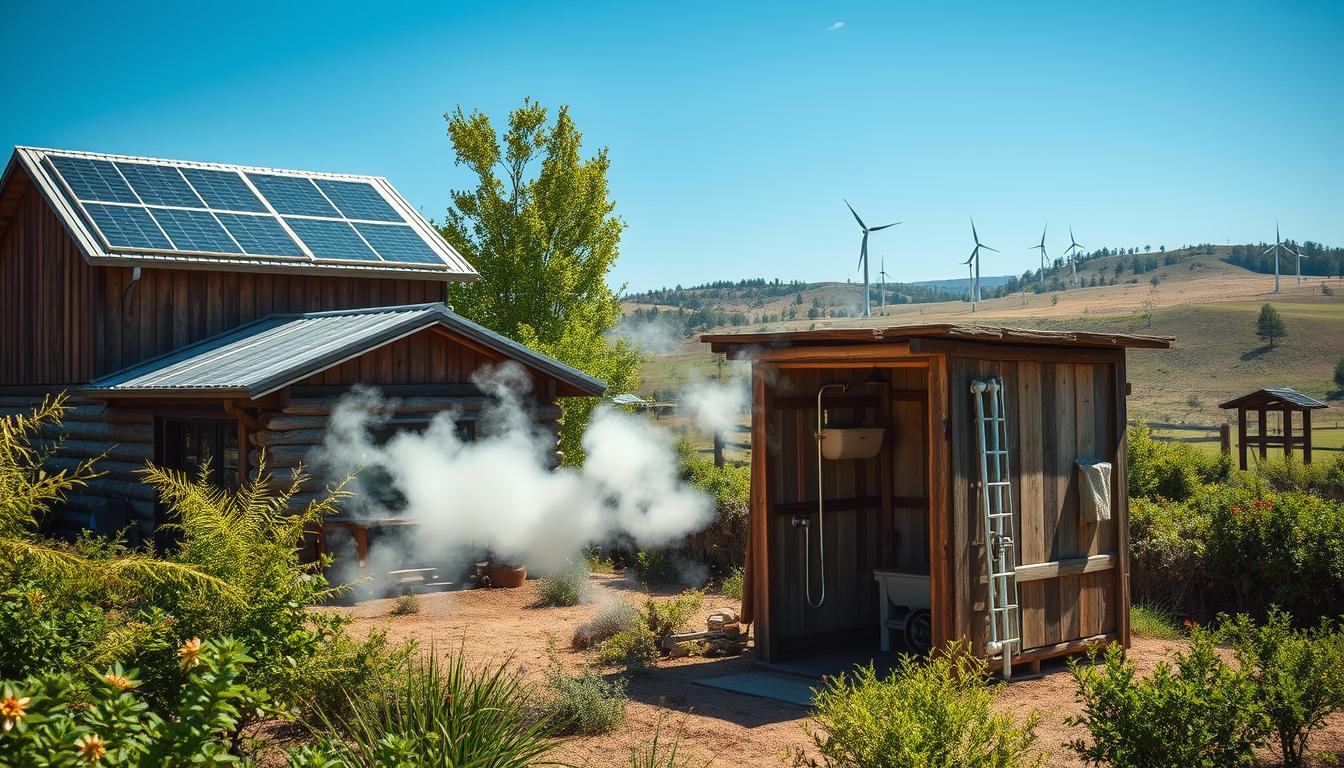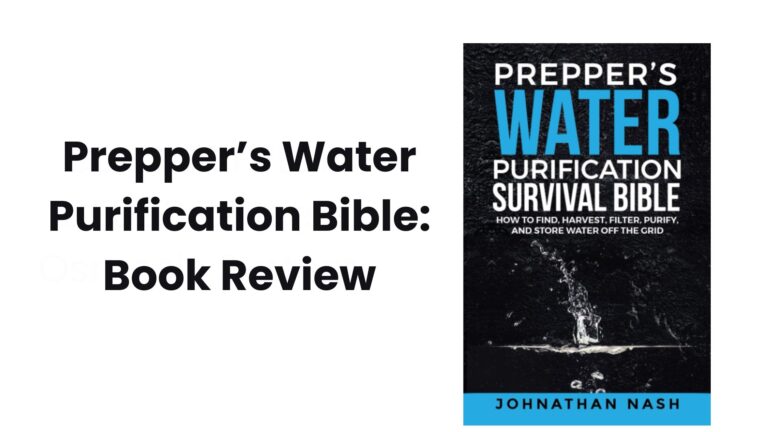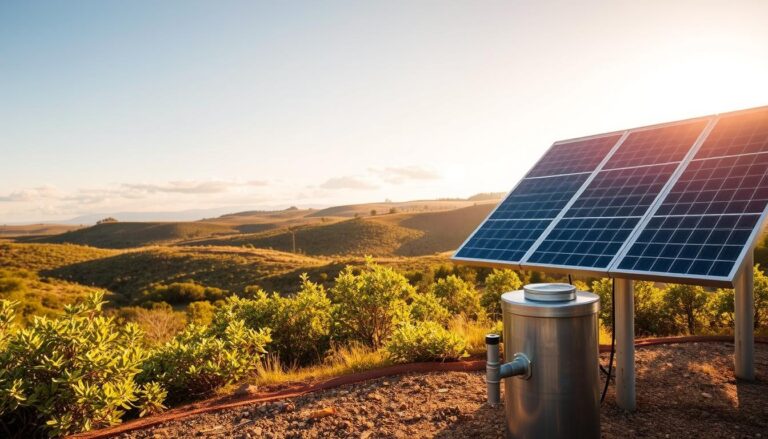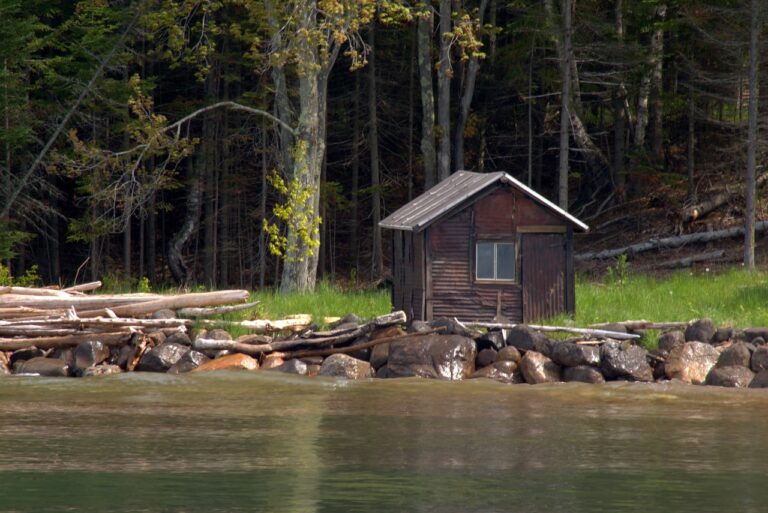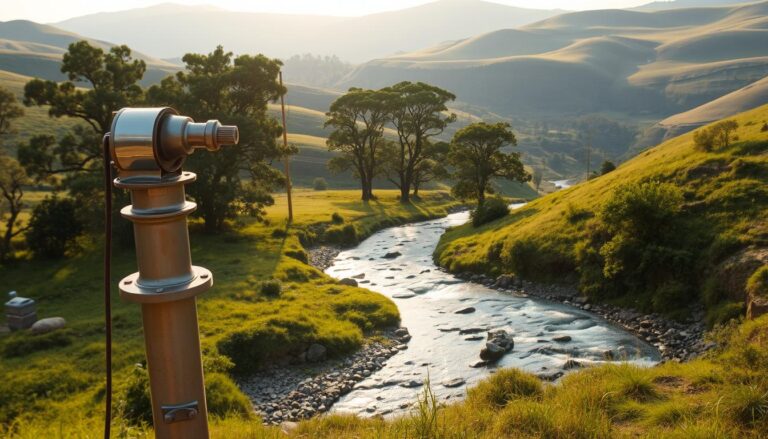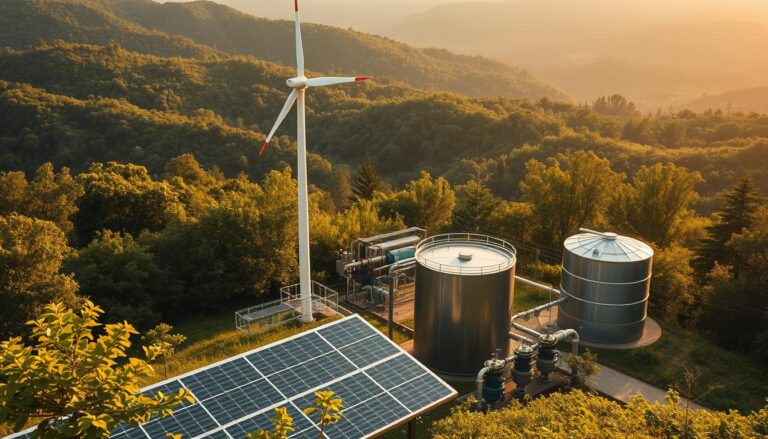Get Hot Water Off-Grid Fast with These 5 Steps
Can you imagine enjoying a warm shower in the midst of a remote wilderness, disconnected from the grid? For many, this is a reality made possible by off-grid hot water solutions. Having a reliable and efficient system for heating water is crucial for comfort and hygiene, whether you’re in a secluded cabin or a mobile home.
Various off-grid hot water systems are available, including solar, propane, and wood-fired systems, each with its unique benefits. For instance, a solar-powered system can utilize excess energy to heat water, providing a sustainable and cost-effective solution.
Key Takeaways
- Understand the different types of off-grid hot water systems available.
- Learn how to choose the most suitable system for your needs.
- Discover the importance of proper insulation for efficiency.
- Explore the role of charge controllers in diverting excess power.
- Find out how to optimize your system’s performance.
The Challenges and Benefits of Off-Grid Hot Water
Off-grid hot water systems present a unique set of challenges, but the benefits are substantial. Traditional electric water heaters, which are commonly used in grid-connected homes, are not feasible for off-grid living due to their high electricity consumption.
Why Traditional Systems Don’t Work Off the Grid
Traditional water heating systems rely heavily on electricity, which is often not a viable option for off-grid homes. Off-grid hot water heaters need to be more self-sufficient, relying on alternative energy sources.
Environmental and Financial Benefits of Going Off-Grid
Switching to off-grid water heating options can significantly reduce your environmental footprint. For instance, solar thermal systems can harness the sun’s energy, reducing reliance on fossil fuels. According to the U.S. Department of Energy, “a solar water heater can save a typical household $400 to $600 per year on energy costs.” Diverting excess solar PV to heat is a smart way to maximize your system’s efficiency.
Setting Realistic Expectations for Your System
It’s crucial to understand that off-grid systems require more planning and maintenance than traditional grid-connected systems. As noted by experts, “the key to a successful off-grid hot water system is proper sizing and installation to meet your specific needs.” Setting realistic expectations based on your energy usage and available resources is vital.
Understanding Your Off-Grid Hot Water Needs
Assessing your off-grid hot water needs is a crucial step in designing an efficient and effective hot water system. To achieve this, you must consider several factors that influence your daily hot water usage.
Calculating Your Daily Hot Water Requirements
To determine your daily hot water needs, consider the number of people in your household and your intended use. For example, a family of four might require around 60-80 gallons of hot water per day for showering, washing dishes, and laundry. You can use the following table as a rough guide to estimate your needs:
| Activity | Hot Water Usage (gallons) |
|---|---|
| Showering | 10-20 per person |
| Washing Dishes | 4-6 |
| Laundry | 7-10 per load |
Climate and Seasonal Considerations
Your geographical location and the prevailing climate significantly impact your hot water needs. For instance, colder climates require more energy to heat water to a comfortable temperature. According to the costs associated with off-grid water systems, understanding these variations is crucial for system design.
Available Resources and Site Constraints
The availability of resources such as sunlight, wood, or other fuels, as well as site-specific constraints like space or local regulations, will influence your off-grid hot water system design. For example, a site with ample sunlight might favor a solar thermal system, while a wooded area might benefit from a wood-fired water heater.
By carefully considering these factors, you can design an off-grid hot water system that meets your needs efficiently and effectively.
Step 1: Choose Your Off-Grid Hot Water System Type
Off-grid hot water systems vary widely, and picking the right one is key to a comfortable and sustainable lifestyle. The choice of system depends on several factors including your energy sources, budget, and hot water needs.
Solar Thermal Systems (Active and Passive)
Solar thermal systems harness the sun’s energy to heat water, offering a renewable and cost-effective solution. Active solar thermal systems use pumps to circulate water or a heat transfer fluid through collectors, while passive systems rely on gravity and natural convection. Active systems are more efficient but also more complex and expensive.
These systems are ideal for locations with ample sunlight. However, their efficiency can be affected by seasonal variations in solar radiation.
Wood-Fired Water Heaters and Rocket Stoves
For those with access to wood fuel, wood-fired water heaters and rocket stoves offer a viable alternative. These systems can provide hot water even in the absence of sunlight, making them suitable for areas with limited solar exposure during certain parts of the year.
Rocket stoves are particularly efficient, burning wood at high temperatures with minimal waste and emissions. They can be integrated with water heating systems to provide a reliable source of hot water.
Propane Tankless and Storage Water Heaters
Propane-powered water heaters, including both tankless and storage types, are another option for off-grid hot water. Tankless water heaters heat water on demand, reducing standby heat loss, while storage water heaters store hot water for later use.
Efficiency Ratings and Consumption Rates
When choosing a propane water heater, it’s crucial to consider their efficiency ratings and consumption rates. Look for units with high efficiency ratings to minimize propane consumption and reduce operating costs.
Alternative Options: Compost and Geothermal
For the more adventurous, compost water heaters and geothermal water heaters present innovative, albeit less common, solutions. Compost water heaters utilize the heat generated from composting organic matter, while geothermal systems tap into the earth’s natural heat.
These alternative systems can offer unique advantages, such as utilizing waste materials or leveraging the earth’s stable temperatures, but may require specific conditions or initial investments.
Choosing the right off-grid hot water system involves weighing the pros and cons of each type, considering your specific needs, resources, and environmental conditions. By doing so, you can ensure a reliable, efficient, and sustainable supply of hot water.
Step 2: Determine Your Primary and Backup Energy Sources
A well-designed off-grid hot water system depends on the effective selection of primary and backup energy sources. This crucial step ensures that you have a reliable supply of hot water under various conditions.
Harnessing Solar Energy Effectively
Solar energy is a popular choice for off-grid hot water systems due to its renewable nature and potential for significant energy savings. Solar thermal systems can be particularly effective, using sunlight to heat water directly or indirectly through a heat transfer fluid.
Sustainable Wood and Biomass Collection
For areas with limited sunlight or as a backup, wood and biomass can be viable options. Wood-fired water heaters and rocket stoves offer efficient ways to heat water using locally sourced materials.
Propane, Natural Gas, and Diesel Considerations
In some cases, propane, natural gas, or diesel might be necessary, especially for backup systems or in regions with limited renewable resources. It’s essential to consider the cost, availability, and environmental impact of these fuels.
Creating Redundancy with Multiple Sources
Using multiple energy sources can provide redundancy and ensure a consistent hot water supply. For example, a solar thermal system can be backed up by a propane or wood-fired heater. This approach can help mitigate the risks associated with relying on a single energy source.
| Energy Source | Reliability | Cost | Environmental Impact |
|---|---|---|---|
| Solar | High (with storage) | Low (long-term) | Low |
| Wood/Biomass | Medium | Medium | Medium |
| Propane/Natural Gas/Diesel | High | High (volatile) | High |
By carefully evaluating these factors and choosing the right combination of primary and backup energy sources, you can create an efficient and reliable off-grid hot water system.
Step 3: Select the Right Equipment and Components
Selecting the right equipment for your off-grid hot water system is crucial for efficiency and reliability. The components you choose will directly impact the system’s performance, safety, and longevity.
Storage Tanks: Sizing, Materials, and Insulation
The storage tank is a critical component of your off-grid hot water system. When selecting a tank, consider factors such as size, material, and insulation. The tank should be sized to meet your daily hot water needs without being overly large, which can lead to unnecessary heat loss.
Materials commonly used for storage tanks include stainless steel, fiberglass, and concrete. Stainless steel tanks are durable and resistant to corrosion, while fiberglass tanks are lighter and often less expensive. The tank should be well-insulated to minimize heat loss, with insulation materials like foam or fiberglass being popular choices.
| Tank Material | Durability | Cost |
|---|---|---|
| Stainless Steel | High | Moderate to High |
| Fiberglass | Moderate | Low to Moderate |
| Concrete | High | Low to Moderate |
Heat Exchangers and Transfer Systems
A heat exchanger is used to transfer heat from the energy source to the water. When choosing a heat exchanger, consider the type of energy source you’re using and the efficiency of the exchanger. Common types include plate heat exchangers and coil-in-tank heat exchangers.
For an off-grid tankless water heater, a highly efficient heat exchanger is crucial to achieve the desired water temperature. The material of the heat exchanger should be compatible with your energy source and water quality to prevent corrosion.
Pipes, Pumps, and Circulation Components
The piping and circulation components are vital for distributing hot water throughout your off-grid home. Pipes should be insulated to prevent heat loss, especially in colder climates. The material of the pipes should be resistant to corrosion and suitable for the water temperature.
Pumps are necessary for circulating water through the system, especially in systems that are not gravity-fed. Consider the power requirements of the pump and whether it can be powered by your off-grid energy source.
Temperature Control and Safety Devices
Temperature control devices, such as thermostats and mixing valves, are essential for maintaining a safe and consistent water temperature. Safety devices, including pressure relief valves and temperature and pressure relief valves, protect the system from excessive pressure and temperature.
Properly sizing and installing these components is critical for the safe operation of your off-grid water heating system. Regular maintenance and inspection of these devices are also necessary to ensure they function correctly.
Step 4: Plan Your Installation Layout
A well-designed installation layout is essential for maximizing the performance of your off-grid hot water setup. Proper planning ensures that your system operates efficiently, minimizing losses and providing a reliable supply of hot water.
Optimal Placement for Maximum Efficiency
The placement of your off-grid water heating system components significantly affects its overall efficiency. For instance, solar thermal collectors should be positioned to receive maximum sunlight throughout the day, ideally facing south at an angle equal to the latitude of your location.
Key Considerations: Avoid shading from trees or buildings, and ensure the collectors are easily accessible for maintenance.
Insulation Requirements and Heat Loss Prevention
Adequate insulation is crucial for preventing heat loss in your off-grid hot water system. This includes insulating storage tanks, pipes, and other components exposed to the elements.
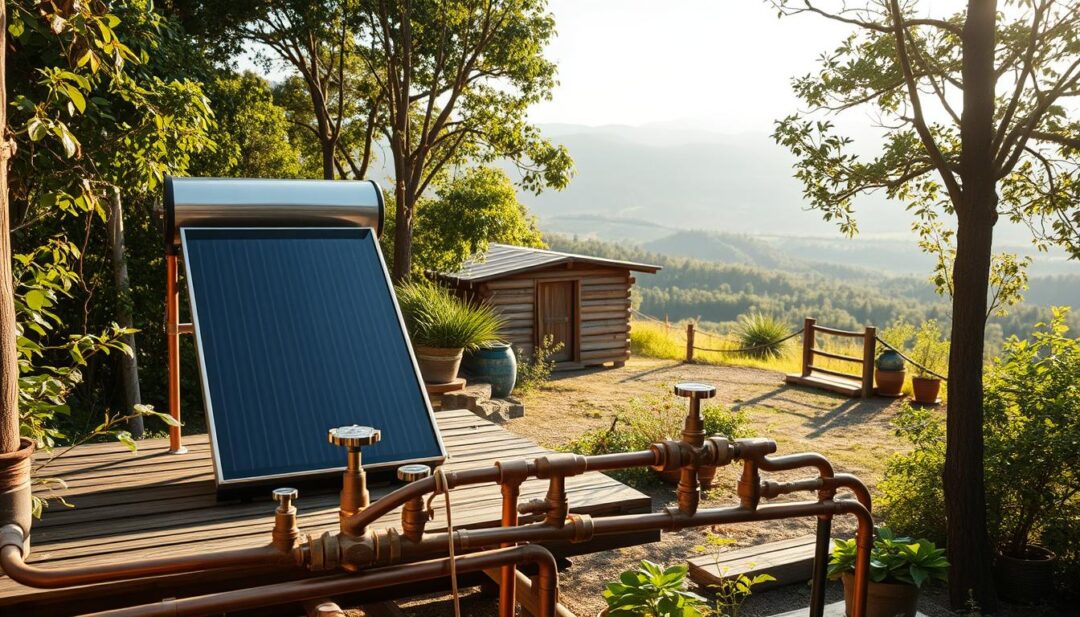
Gravity-Fed vs. Pressurized Systems
Choosing between a gravity-fed and a pressurized system depends on your specific needs and site conditions. Gravity-fed systems are simpler and less prone to mechanical failures, while pressurized systems offer more flexibility in terms of component placement.
Freeze Protection Strategies
In colder climates, protecting your system from freezing is critical. Strategies include using freeze-tolerant materials, draining the system seasonally, or incorporating heating elements to maintain a minimum temperature.
| System Type | Freeze Protection Method | Cost Consideration |
|---|---|---|
| Gravity-Fed | Drainage or Insulation | Lower Initial Cost |
| Pressurized | Heating Elements or Glycol | Higher Initial Cost |
Step 5: Install and Test Your Off-Grid Hot Water System
Proper installation is crucial for the efficiency and safety of your off-grid hot water system. A well-installed system not only provides reliable hot water but also minimizes the risk of accidents and reduces maintenance costs over time.
DIY Installation Guidelines and Safety Precautions
For those opting for a DIY installation, it’s essential to follow safety guidelines to avoid injuries and ensure the system operates as intended. This includes wearing protective gear, following manufacturer instructions, and testing the system thoroughly before regular use.
Key safety precautions include ensuring proper ventilation for systems that use combustion, securing tanks and pipes to prevent damage from weather or wildlife, and using appropriate electrical insulation and grounding.
When to Hire a Professional Installer
While DIY installation can be cost-effective, certain situations may require the expertise of a professional. If your system involves complex components or you’re unsure about any aspect of the installation, it’s wise to hire a professional to avoid potential risks and ensure compliance with local building codes.
System Testing and Performance Verification
After installation, thorough testing is necessary to verify that the off-grid hot water solution is working correctly. This involves checking for leaks, ensuring that the system heats water to the desired temperature, and verifying that all safety devices are functioning.
Initial Troubleshooting and Adjustments
Initial troubleshooting involves monitoring the system’s performance over the first few weeks of operation and making any necessary adjustments. This may include tweaking temperature settings, checking for leaks, or adjusting the system’s configuration to better match your hot water needs.
By following these steps and ensuring a proper installation, you can enjoy a reliable and efficient off-grid hot water system that meets your needs while minimizing environmental impact.
How to Get Hot Water Off Grid on a Budget
Off-grid hot water on a budget is achievable with the right strategies. There are several cost-effective ways to achieve off-grid hot water, making it accessible to a wider range of people.
Cost-Effective DIY Solutions Under $500
One of the most budget-friendly options for off-grid hot water is DIY solar water heaters. These systems can be built for under $500, depending on the materials used. A simple solar thermal system can be constructed using a black tank, insulation, and a wooden frame, providing a cost-effective off-grid water heating option.
Another affordable solution is repurposing old water heaters or components. For instance, an old electric water heater can be converted into a solar water heater with some modifications.
Repurposing and Upcycling Materials
Repurposing materials is not only budget-friendly but also environmentally friendly. Old copper pipes can be used to create a heat exchanger for a solar thermal system. Similarly, discarded wooden pallets can be used to build a storage tank enclosure, reducing waste and saving money.
Phased Implementation Strategies
Implementing an off-grid hot water system in phases can make it more manageable and affordable. Starting with a basic system and gradually upgrading it as resources become available is a practical approach. For example, beginning with a simple solar thermal collector and later adding more collectors or a storage tank.
Grants and Incentives for Renewable Energy Systems
Various government and non-government organizations offer grants and incentives for installing renewable energy systems, including off-grid hot water heaters. Researching and applying for these programs can significantly reduce the upfront costs of an off-grid hot water system.
It’s essential to explore local, state, and federal incentives that can help offset the costs. Some utility companies also offer rebates for energy-efficient systems, making it worthwhile to check with local providers.
Seasonal Adaptations for Your Off-Grid Hot Water System
Adapting your off-grid hot water system to the changing seasons is crucial for optimal performance. As the weather changes, so do the demands on your system, requiring adjustments to maintain efficiency and reliability.
Winter Preparations and Freeze Protection
During winter, protecting your off-grid hot water system from freezing temperatures is paramount. Insulate exposed pipes, and consider using freeze-proof valves and drain-down systems to prevent damage. For solar thermal systems, ensure that the antifreeze solution is adequate for the lowest expected temperatures.
Summer Optimization and Excess Heat Management
In the summer, your off-grid hot water system may produce more hot water than you need, especially if you’re using a solar thermal system. Implementing a heat dump or a thermosiphon system can help manage excess heat, preventing overheating and potential system damage.
Spring and Fall Maintenance Routines
During spring and fall, perform routine maintenance to ensure your system remains in good condition. Check for leaks, inspect the condition of insulation, and verify that all components are functioning correctly. These seasons are also ideal for preparing your system for the upcoming extreme weather conditions.
| Season | Key Actions | Benefits |
|---|---|---|
| Winter | Insulate pipes, use freeze-proof valves | Prevents damage from freezing |
| Summer | Implement heat dump or thermosiphon | Manages excess heat, prevents overheating |
| Spring/Fall | Check for leaks, inspect insulation | Maintains system efficiency, prepares for extreme weather |
By adapting your off-grid hot water system to the changing seasons, you can ensure it remains efficient, reliable, and safe throughout the year. Regular maintenance and seasonal adjustments are key to enjoying a consistent supply of hot water, even in the most remote locations.
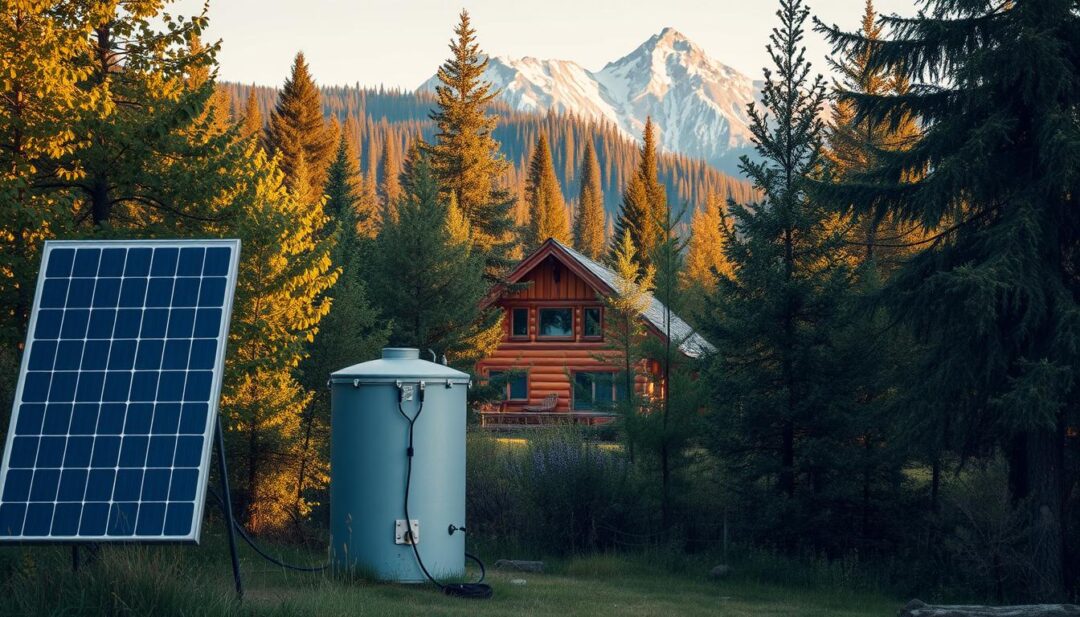
Troubleshooting and Maintaining Your Off-Grid Hot Water System
Troubleshooting is an essential skill for off-grid hot water system owners. Regular maintenance is key to ensuring the longevity and efficiency of your system. Whether you’re using an off grid tankless water heater or a more traditional storage system, understanding how to identify and fix common issues is crucial.
Common Problems and Their Solutions
Common issues with off grid water heating systems include leaks, inadequate heating, and system freezes. To address these, it’s essential to inspect your system regularly. Check for signs of wear on pipes and connections, ensure that your energy source is functioning correctly, and verify that your system’s insulation is adequate.
Regular Maintenance Schedule
A regular maintenance schedule can help prevent many common issues. This includes:
- Monthly checks on temperature and pressure relief valves
- Quarterly inspections of pipes and fittings for leaks or damage
- Annual flushing of sediment from storage tanks
When to Repair vs. Replace Components
Deciding whether to repair or replace components depends on the age and condition of your system. For older systems, it might be more cost-effective to replace major components. A comparison of repair vs. replacement costs can help make this decision.
| Component | Repair Cost | Replacement Cost |
|---|---|---|
| Heating Element | $50-$100 | $200-$500 |
| Storage Tank | $100-$300 | $800-$1,500 |
Extending System Lifespan
To extend the lifespan of your off grid water heating system, regular maintenance is crucial. Additionally, using high-quality components and ensuring proper installation can significantly impact how long your system lasts.
Real-Life Success Stories: Off-Grid Hot Water in Action
Real-life examples demonstrate that off-grid hot water is not only achievable but also practical and sustainable for diverse lifestyles. Individuals and families have successfully implemented off-grid hot water setups, enjoying the benefits of reduced utility bills and increased energy independence.
Tiny Home and Cabin Solutions
In tiny homes and cabins, space is limited, making efficient off-grid water heating ideas crucial. Many have turned to solar thermal systems, which harness the sun’s energy to provide hot water. For instance, a family in Colorado installed a solar thermal system that meets their hot water needs year-round, significantly reducing their reliance on propane heaters.
Homestead and Farm Applications
On larger properties, such as homesteads and farms, there’s often more space to implement comprehensive off-grid systems. A notable example is a farm in Oregon that uses a combination of solar and wood-fired water heating to supply hot water for the household and farm operations. This hybrid system ensures a consistent hot water supply, even during periods of low sunlight.
Mobile Living: RVs and Vans
For those living in RVs and vans, off-grid hot water systems are compact and efficient. Many have adopted propane tankless water heaters, which provide a reliable and continuous supply of hot water without the need for large storage tanks. A couple traveling across the United States in their RV reported satisfaction with their propane tankless system, praising its efficiency and convenience.
Conclusion: Enjoying the Freedom of Off-Grid Hot Water
Embracing off-grid hot water solutions can be a transformative decision for those seeking independence and reliability in their daily lives. By understanding your hot water needs and choosing the right system, you can enjoy the benefits of a sustainable and self-sufficient lifestyle.
Off-grid hot water systems provide a reliable means of accessing hot water without being tied to municipal supplies. Whether you’re living in a remote cabin, a tiny home, or an off-grid homestead, these systems offer the freedom to live life on your own terms.
For those looking to implement a tankless gas water heater as part of their off-grid solution, it’s essential to follow proper installation guidelines to ensure safety and efficiency. You can learn more about the installation process on our website, which provides detailed guides on how to install a tankless gas water.
By adopting off-grid hot water solutions, you’re not only reducing your reliance on public utilities but also contributing to a more sustainable future. Take the first step towards enjoying the freedom and benefits of off-grid hot water today.

